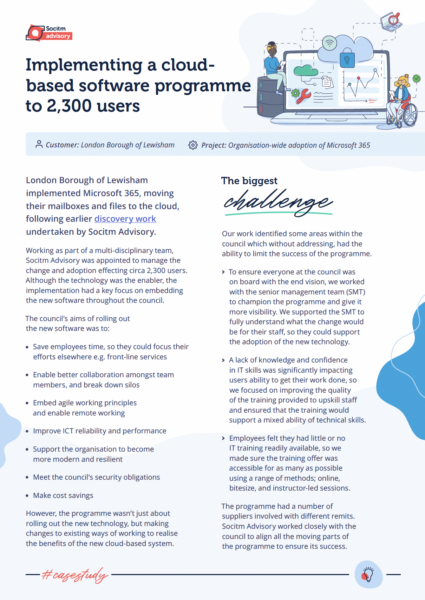Background
London Borough of Lewisham implemented Microsoft 365, moving their mailboxes and files to the cloud, following earlier discovery work undertaken by Socitm Advisory. Working as part of a multi-disciplinary team, Socitm Advisory was appointed to manage the change and adoption effecting circa 2,300 users. Although the technology was the enabler, the implementation had a key focus on embedding the new software throughout the council.
The council’s aims of rolling out the new software was to;
- Save employees time, so they could focus their efforts elsewhere e.g. front line services
- Enable better collaboration amongst team members, and break down silos
- Embed agile working principles and enable remote working
- Improve ICT reliability and performance
- Support the organisation to become more modern and resilient
- Meet the council’s security obligations
- Make cost savings
However, the programme wasn’t just about rolling out the new technology, but making changes to existing ways of working to realise the benefits of the new cloud-based system.
Our brief and the project goals
The aim of our work was to:
- Implement an effective employees-focused communications plan to support the programme roll-out and adoption of the new software
- Support employees with engaging training, to use the full functionality of Microsoft 365 (SharePoint, Teams, Word, Excel, PowerPoint, Outlook, OneNote)
- Support the migration of Outlook mailboxes and OneDrive
- Offer business change support to help embed new ways of working
Biggest challenges
Our work identified some areas within the council which without addressing, had the ability to limit the success of the programme.

To ensure everyone at the council was on board with the end vision, we worked with the senior management team (SMT) to champion the programme and give it more visibility. We supported the SMT to fully understand what the change would be for their staff, so they could support the adoption of the new technology.

A lack of knowledge and confidence in IT skills was significantly impacting users ability to get their work done, so we focused on improving the quality of the training provided to upskill staff and ensured that the training would support a mixed ability of technical skills.

Employees felt they had little or no IT training readily available, so we made sure the training offer was accessible for as many as possible by using a range of methods; online, bitesize and instructor-led sessions.
The programme had a number of suppliers involved with different remits. Socitm Advisory worked closely with the council to align all the moving parts of the programme to ensure its success.
“The expertise and advice Socitm Advisory brought to this programme was invaluable. Capacity and resource was big constraint for us, and Socitm Advisory filled that void. The quality of the communications, branding, design and training materials that we have been left with has put us in great position to train new starters.”
Evette McDonald, London Borough of Lewisham
Our approach
By working closely with the council team we gathered feedback around training, communications and pain points.
Discovery
We identified 14 major areas that required improvement by the new software. This included overcoming issues such as; time wasted requesting permission to access files, being unable to access files in SharePoint, over-reliance on sharing files by email, manual processes and workflows, and data risks caused by an over reliance of using email to store documentation.
We also gathered feedback from users regarding core communications and content such as email, team meetings, Yammer, WhatsApp, the intranet and MS Teams.
Finally, we looked at training. We found various methods were preferred by staff and therefore would approach training through a combination of trainer-led sessions, self-service user guides, videos and tips as well as one-to-one support through colleagues, the IT team and super users.
Implementation
To meet the high level strategy goals and address the underlying issues our consultants focused on:
- Increasing the staff’s confidence and engagement with technology
- Ensuring staff had a clear understanding of which documents live where and how to work with them effectively
- Building more advanced technical ability once confidence had improved, to realise further benefits
Our activity included:
- Creating persona-based communications tailored to the key benefits of Microsoft 365 and communications around risks and benefits
- Developing targeted, more advanced training and communications for specific users
- Training in the core suite of Microsoft 365, and where and how to store documents
- Establishing a Teams-first way of working with information controls for sensitive information
To specifically address the pain points identified, solutions put in place included using MS Teams as the front end for file sharing, training to lock down sensitive information, training on the cloud, clear guidance for where documents should be stored, Outlook training including how to make most effective use of Outlook, and collaborative working using the benefits of SharePoint and Teams.
To aid communications, Socitm Advisory created branding. The branding gave the programme a presence across templates for email, Word, PowerPoint, stand out MS Teams announcements and across the training materials and resources.
Finally, a recommendation to appoint digital champions was adopted. The champions acted as a ‘go to’ for employees needing further support.
Outcomes and benefits
We ensured the benefits linked with Lewisham’s values and Together Lewisham programme, and took a blended approach to employee learning.
Following our work with council staff, our survey’s after each training session found the training effectiveness score increased from a pre project 2.1 out of 5 to 4.6 out of 5. Staff had a better understanding of the system and how to use it. It was also evident that the confidence of users had significantly increased.
We left valuable, branded training materials and communications with the council team so they could use and adapt it on an ongoing basis.
Future outlook
Now the council has a solid M365 platform it will be able to further embed the changes across the organisation, ensure widespread adoption of the system’s full capabilities and further realise the benefits of their E5 licenses.
